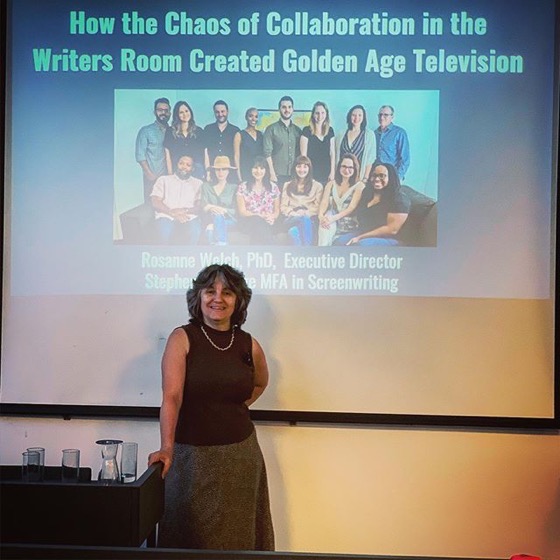Nearly two years ago I had the pleasure of being invited to join a panel at the then upcoming SCMS (Society of Cinema and Media Studies) conference set for Seattle. As you know that was canceled due to Covid with the hopes of reconvening in Colorado in 2021. That became a virtual conference but our group decided to reapply our panel and we four were able to ‘meet’ on Zoom on Sunday and present: Writing Between the Lines: Feminist Strategies for Historical Absences, Cliché, and the Unreliable Narrator.
Here you can watch a clip from my part of the presentation,
“When Men Forget Women: The Many Ways Male Screenwriters Fail to Mention their Female Colleagues in Oral Histories”
Screenwriters who write textbooks are unreliable narrators. When Mark Norman wrote What Happens Next he has about six women mentioned in the entire book and he declares that their work wasn’t very worth studying. So this is not a textbook that I use after two years of trying it and my students pretty much having a fit. Now I love Tom Stempel. Tom gave us the first book on screenwriting history but he didn’t know anything about Francis Marion at the time. He didn’t have much to say about her and I’ll tell you why in a second. For McPherson, he listened to what Cecil B DeMille had to say and that’s what ends up in his book. Now i’ve been lucky enough to have him come to speak to my students and he has apologized because he’s learned more in the days since he wrote that book and he asked the publishing company could he do a rewrite but they didn’t think that the ratio of new pages would make the higher price worth it and they didn’t give that to him but he has a column you can read in Script Magazine and he tries to cover for the things he missed originally.
Watch this entire presentation
Podcast: Play in new window | Download
Subscribe: RSS
![05 Unreliable Narrators In Textbooks from When Men Forget Women: The Many Ways Male Screenwriters Fail to Mention their Female Colleagues [Video]](https://rosannewelch.com/wp-content/uploads/2022/05/rmw-scms-2021-05.jpg)
![04 Joan Harrison & Jeannie Macpherson from When Men Forget Women: The Many Ways Male Screenwriters Fail to Mention their Female Colleagues [Video]](https://rosannewelch.com/wp-content/uploads/2022/05/rmw-scms-2021-04.jpg)
![03 Teaching the History of Screenwriting from When Men Forget Women: The Many Ways Male Screenwriters Fail to Mention their Female Colleagues [Video]](https://rosannewelch.com/wp-content/uploads/2022/05/rmw-scms-2021-03.jpg)



![02 How Do We Get Forgotten? from When Men Forget Women: The Many Ways Male Screenwriters Fail to Mention their Female Colleagues [Video]](https://rosannewelch.com/wp-content/uploads/2022/04/rmw-scms-2021-02.jpg)
![01 Introduction from When Men Forget Women: The Many Ways Male Screenwriters Fail to Mention their Female Colleagues [Video]](https://rosannewelch.com/wp-content/uploads/2022/04/rmw-scms-2021-01-1-1200x675.jpg)
![01 Introduciton from When Men Forget Women: The Many Ways Male Screenwriters Fail to Mention their Female Colleagues [Video]](https://rosannewelch.com/wp-content/uploads/2022/04/rmw-scms-2021-01.jpg)
![24 Conclusion from How The Chaos Of Collaboration in the Writers Room Created Golden Age Television [Video]](https://rosannewelch.com/wp-content/uploads/2021/08/srn-porto-24.jpg)


![23 Being True To Your Ideas from How The Chaos Of Collaboration in the Writers Room Created Golden Age Television [Video]](https://rosannewelch.com/wp-content/uploads/2021/08/srn-porto-23.jpg)
![22 Getting What You Want In The Room from How The Chaos Of Collaboration in the Writers Room Created Golden Age Television [Video]](https://rosannewelch.com/wp-content/uploads/2021/07/srn-porto-22.jpg)
![21 In The Room Where It Happens from How The Chaos Of Collaboration in the Writers Room Created Golden Age Television [Video]](https://rosannewelch.com/wp-content/uploads/2021/07/srn-porto-21.jpg)